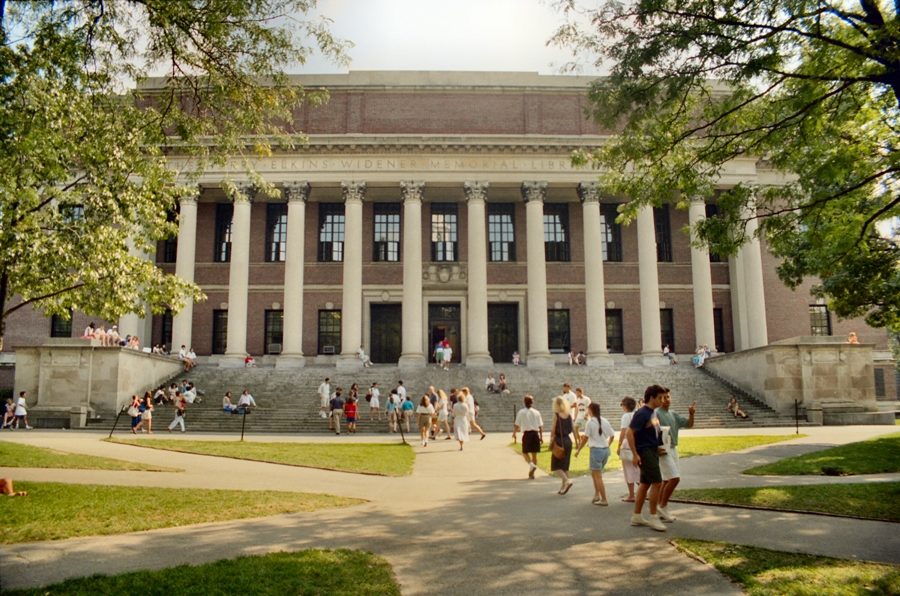What I learned after applying to colleges
Photo via Flickr (Will Hart) under Creative Commons license
Students walk on Harvard University’s campus in Cambridge, Mass. While the prestige of certain colleges may be attractive to prospective students, there are more important factors, such as the quality of academics and personal fit, that should be considered before applying to them.
May 3, 2018
Researching brand name colleges within my affordability threshold. Scrolling through pages upon pages of posts made on College Confidential and other college admissions websites. Habitually comparing my academic credentials to other applicants’ seemingly perfect grades and test scores. Typing away at the keyboard for hours in hopes of devising a quality essay. Anxiously refreshing my personal email ten times in the span of a school day. For the past several months, my life has been composed of these obsessive actions.
Such actions were fueled by concern. All I have achieved throughout high school condensed into a single college application and placed into the hands of an admissions officer who would determine my fate. By late March, I would discover how far the accomplishments I have made, both in and out of the classroom, would take me.
It has been more than one month since I received my last admissions decision, and I have learned more about myself in this time frame than I have in four years. I have acknowledged the importance of factors that my younger self would scoff at as excuses for not attending a highly-ranked school. Although the college that I am attending is what I had hoped for it to be, I’ve grown to love it for everything it offers beyond its reputation.
When I realized this, I knew that the mindset I’ve had since my freshman year of high school was no longer the same. The lessons learned from this process extend well beyond chasing prestige.
Fit is important
While being able to tell a friend or relative that you’re attending a certain college sounds exciting, it is crucial to take your own needs and preferences into consideration when deciding where to spend the next four years (or more) of your life. By depending on others’ approval of your chosen college, you are allowing individuals other than yourself to dictate your happiness, which isn’t worth it in the long run.
Having said this, it is crucial to pay close attention to the aspects of each college you have been accepted to. Read about each college’s location, population size, and available majors, and be realistic while examining your options. If a college does not offer a major that you are committed to pursuing, for instance, it is in your best interest to attend one that does.
Visiting a college’s campus is the best way to decide if it provides the right environment for you. Trust your instincts as you tour it. If you cannot envision yourself thriving in it, don’t hesitate to move on.
The college you attend does not define you
Throughout the years, getting into the nation’s best schools has become notoriously more difficult. Due to thousands of students competing for a limited number of seats, most top-ranked colleges have experienced significant drops in their acceptance rates. In the span of five years, New York University’s admission rate dropped from 35% in 2013 to 19% in 2018.
While securing an acceptance letter from a renowned college is worth celebrating, being unsuccessful in doing so is not a reflection of one’s academic achievements. Colleges receive many more applications from academically qualified students than they can accept.
Fortunately, where you attend college does not determine who you are as a person. It never did, and it never will. College is what students make of it themselves, and by being motivated to excel and engaging in hard work, students will find success wherever they go.
There’s more to life than going to college
Due to the intensity of the college admissions process, it may seem like where you go to college will either propel or hinder your chances of being successful. For students who have directed their energy toward enhancing their résumés, there is also a considerable amount of pressure for the college experience to be nothing less than perfect. Consequently, when they end up in a situation they did not envision themselves being in, feelings of defeat usually emerge.
Idealizing certain colleges was a problem I had for a long time. I constantly told myself that if I got accepted to my number one school, everything would be rainbows and butterflies. As I continued thinking in black and white, however, I failed to realize that attending college will be nothing more than a brief period of my life.
As cheesy as it sounds, there’s much more to look forward to in our lives than going to college. Like other eighteen year olds, I still have an abundance of time to meet amazing people, expand my knowledge, and create memories that I will fondly look back on. Attending college isn’t a prerequisite to experience the joys life has to offer, and it certainly isn’t meant to be the peak of anyone’s life. If anything, it is meant to prepare its students for their lives ahead of them.
It goes without saying that while entering higher education is important, where you attend college will not make or break your job opportunities. By maintaining a strong work ethic and attending a college that makes you happy to be there, success will be at your fingertips sooner than you realize.








